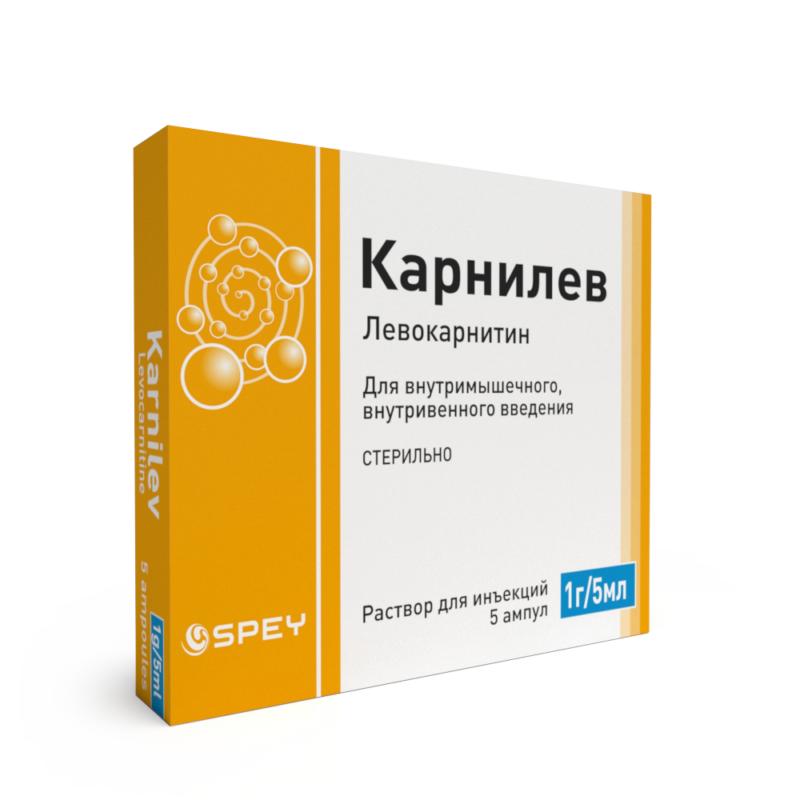
Karnilev Ampoula
L-Carnitine is present as a natural constituent in animal tissues, micro-organisms and plants. In man the physiological metabolic requirements are met both by the consumption of food containing carnitine and the endogenous synthesis in the liver and kidneys from lysine with methionine serving as the methyl donor.
Composition
Each ampoule contains:
active substance: levocarnitine (L-carnitine) – 1 g.
excipients: hydrochloric acid – 10%, water for injection.
Indications for use
- secondary carnitine deficiency – congenital (organic aciduria), acquired alimentary carnitine deficiency (malabsorption, intestinal diseases), in patients receiving hemodialysis for a long time and having the following symptoms – severe persistent muscle spasms, myopathies, loss of muscle mass, skeletal muscle weakness, symptoms hypotension, anemia, impaired renal reabsorption (CRF)
- impaired metabolism in the myocardium in the case of ischemic cardiomyopathy (in the myocardium, the utilization of fatty acids as an energy source occurs very intensively, therefore it especially needs L-carnitine, after its use, an increase in the force of contractions is noted, prevention of further muscle degeneration, normalization of the ECG)
- angina pectoris, acute myocardial infarction, a state of severe hypoperfusion due to cardiogenic shock
- damage to the central and peripheral nervous system, respiratory distress – syndrome, impaired psychomotor development, seizures, ataxia, pyramidal disorders, disorders of the oculomotor nerves (external ophthalmoplegia, ptosis, etc.)
- polyneuropathy with liver damage (progressive hepatomegaly, liver fibrosis, liver failure phenomenon, kidney damage (Fanconi triad, phosphaturia, glucosuria, aminoacidizing), endocrine disorders (growth retardation, hypoglycemia), hearing impairment (sensorineural deafness), visual impairment ( optic atrophy, retinal pigment degeneration, cataract), gastrointestinal disorders
- diseases and conditions accompanied by decreased appetite, weight loss, wasting in adults and children
- anorexia nervosa syndrome (anorexia nervosa) and physical exhaustion in mental illness, dyscirculatory and traumatic encephalopathy
- chronic pancreatitis with exocrine insufficiency
- chronic gastritis with decreased secretory function; consequences of birth trauma and newborn asphyxiation
- newborns, premature and term-born children with weakened food reflexes (flaccid sucking), with hypotrophy, hypotension and adynamia
- respiratory distress syndrome in newborns, nursing premature newborns on complete parenteral nutrition
- neonatal jaundice
- during the period of convalescence after serious illnesses and surgical interventions
growth retardation and underweight in children and adolescents under 16 years old, mild thyrotoxicosis in children and adolescents under 16 years old - as part of complex therapy for skin diseases (psoriasis, seborrheic eczema, focal scleroderma and discoid lupus erythematosus)
- prolonged intense sports training or other increased loads (as an anabolic and adaptogen) to increase performance, endurance and reduce fatigue
- exogenous constitutional obesity.
Mode of application
Solution for injection.
For adults, children, newborns: It is administered intramuscularly, intravenously, slowly (2-3 minutes) or by infusion. It is recommended to monitor therapy by measuring the level of free and acetylated L-carnitine in plasma and urine to determine an adequate dosage.
In acute disorders of cerebral circulation, 1 g per day is prescribed for 3 days, and then 0.5 g per day for 7 days. After 10-12 days, repeated courses are possible within 3-5 days.
With the appointment of the drug in the subacute and recovery period, with discirculatory encephalopathy and various brain lesions, carnitine deficiency, the patient is administered Karnilev’s solution at the rate of 0.5-1 g per day intravenously (drip, jet) or BM (2-3 times a day) without breeding for 3-7 days. If necessary, after 12-14 days, appoint a second course.
Intravenous injection, slowly (2-3 min.) Appointed with secondary deficiency of carnitine in hemodialysis – 2 g once (after the procedure); with acute myocardial infarction, acute heart failure – 3-5 grams per day, divided into 2-3 doses in the first 2-3 days, followed by a dose reduction of 2 times; with cardiogenic shock – 3-5 g per day, divided into 2-3 admission to the patient’s exit from shock.
With congenital metabolic problems: the dosage depends on the congenital abnormalities in the metabolism and the degree of expression during the treatment period. In the case of acute decompensation, appoint up to 100 mg / kg per day in 3-4 divided doses. If there is a need for higher doses, but at the same time the likelihood of side effects, for example, diarrhea, increases. If improvement was achieved with the use of injectable forms of the drug, then it is possible to continue maintenance therapy with Karnilev’s solution for internal administration with doses of 1 g per day.